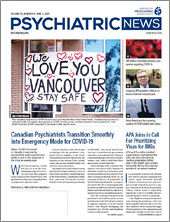Resident physicians serve a unique and important role in hospitals nationwide, as they are responsible for providing patient care while simultaneously furthering their own medical education. The overlapping responsibilities present a complex set of mental health concerns. While residency is often a time filled with self-doubt related to competency, added pressures and increased responsibilities related to COVID-19 are exacerbating these fears.
As patients decompensate rapidly (despite receiving the appropriate interventions), residents are voicing concerns about being unprepared for work assignments outside their area of specialty. Many residents have suddenly become the primary point of contact between the medical team and a patients’ family. Now, end-of-life care discussions occur remotely, a difficult task even for the most experienced practitioners. Residents outside of critical care and emergency medicine feel they are not contributing enough, raising a feeling of imposter syndrome felt by many in medical school.
Although work hours continue to be regulated by the Accreditation Council for Graduate Medical Education, each shift a resident faces feels more physically and emotionally demanding due to patient acuity, patient volume, and unfamiliar changes in staffing protocols. Residents often operate as a cohesive unit; some now express feeling guilty about burdening their peers when COVID-19 exposure requires time off or when asking for an exception to be made in situations involving their own immunosuppression or pregnancy. The fear of impacting team members negatively, coupled with the lack of power and status within the medical hierarchy, may be compounded.
It is in times of uncertainty and upheaval when the role of mental health treatment becomes even more vital. Our team at Rowan University School of Osteopathic Medicine’s Outpatient Medical Student and Resident Mental Health Program has identified interventions that can be implemented at the individual, program, and institutional levels to lessen the burden on residents.
The therapeutic holding environment described by Donald Winnicott in his 1965 book The Maturational Processes and the Facilitating Environment has become a valuable tool in the treatment of residents who are overwhelmed and stressed. This psychological environment can be a healing, comforting, safe space in which residents can feel heard. When patients feel comfortable to share their experiences, clinicians can function to normalize the gravity of the situation and the range of emotional reactions that patients are feeling. Analogously, clinicians can aid in educating residents about the grieving process and how the pandemic has led not just to grief over mortality, but to losses in relationships, functioning, and structure.
Clinicians must embrace their role as stewards of mental health, as mental health and self-care may easily fall to the bottom of residents’ priority list. It has become apparent that, in a time of additional stressors, continuing access to affordable and timely care is a vital part of maintaining residents’ mental well-being.
In the three months since transitioning to telepsychiatry in Rowan’s clinic, new delivery methods have alleviated the concern for additional COVID-19 exposure within the outpatient setting and added additional access with the new flexibility in scheduling—a seemingly small change that may provide exponential returns in terms of patient access, especially for residents.
Clinicians should be allies with residents in establishing routines that may include exercise, healthy diets, social connectedness, psychotherapy, and medication. We can emphasize work on problem solving and interpersonal skills that are especially useful within professional and personal relationships as residents adapt to new roles and responsibilities. And we can be powerful advocates when residents feel powerless to speak up, such as regarding access to personal protective equipment.
It is imperative that program directors know what mental health resources are available for residents and understand the varying levels of treatment offered. This information should be widely disseminated. Residents need the flexibility to bypass any lengthy pre-COVID-19 triage process, if it exists, and must be able to access clinicians directly and confidentially for consultation.
Community hospitals need to reassess which mental health resources they are offering, as many only refer residents to an employee assistance program. These programs are rarely specialized to meet the needs of residents. Now, more than ever, residents require access to clinicians with experience in and understanding of the educational and job demands they face.
Program directors should accommodate for residents who need mental health treatment, not just those with physical ailments. Program directors can help residents by bearing in mind the impact of COVID-19 on the personal lives of residents and afford increased flexibility in caring for ill family members or meeting child care needs, as traditional options are now limited. If possible, residents should be allowed to volunteer for rotations in critical care and emergency medicine to foster a sense of control, agency, and autonomy.
It is equally important that institutions, whether community hospitals or large academic centers, value the mental health of residents. Even in a time of medical and financial crisis, residents remain the workhorses. When understanding systemwide financial models, institutions need to consider the liability they may incur if residents are unable to properly perform their duties. Not only are there short-term impacts on direct patient care, but also long-term effects on program reputation and physician recruitment. No-cost solutions, like prioritizing full transparency and relaying protocols and treatment guidelines to all physicians within the system in a timely manner, regardless of position within the hierarchy, can help maximize the effectiveness of all staff, not just residents.
As new interns enter hospitals nationwide, institutions need to be proactive rather than reactive and make mental health resources available from the start. A destigmatized environment needs to be created in which residents feel free to seek help and are assured of accessibility, confidentiality, and affordability. Finally, as the new academic year begins, institutions also need to pay attention to the mental health needs of interns who have graduated early from medical school to enter internships within COVID-19 hotspots. ■


